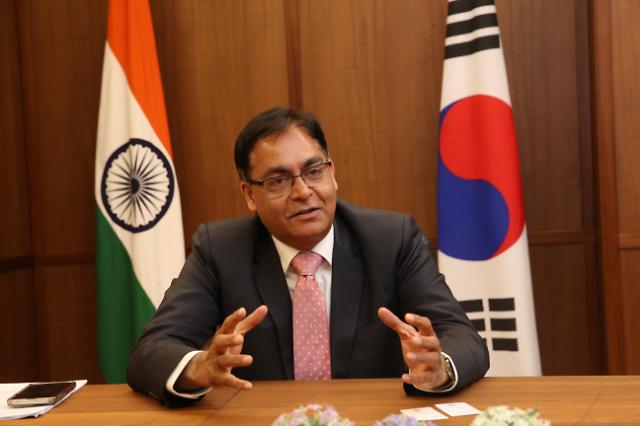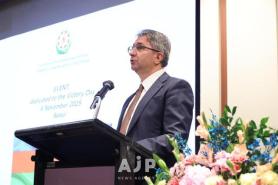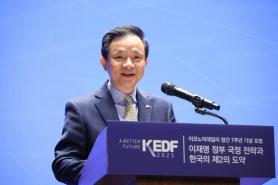
Amit Kumar, the Indian Ambassador to South Korea [Photograph by Park Sae-jin = swatchsjp@ajunews.com]
SEOUL -- India is ready to discover new areas of economic cooperation with South Korea as the two nations' economic ties have steadily increased for the last 50 years, with both countries recognizing the immense potential for collaboration and partnership. Indian envoy to South Korea Amit Kumar confidently said cooperation in green hydrogen, electric vehicle, digital transformation, and pharmaceuticals would benefit each other.
Government data showed that South Korea's exports to India reached $18.8 billion in 2022, up 21 percent from a year ago while imports rose 10.5 percent year-on-year to $8.9 billion. South Korea's export products include semiconductors and steel plates, while main import items were petroleum products and aluminum. Sales of Hyundai Motor and Kia vehicles in India also have increased for more than 12 consecutive months. Accumulated sales of Hyundai and Kia cars in India in the first four months of 2023 stood at 295,359 units, up 15.5 percent from the same period a year ago.
South Korea's volume of trade with India skyrocketed to $20.5 billion in 2011 from $2.6 billion in 2002. Ambassador Kumar said the two countries' comprehensive economic partnership agreement (CEPA) which took effect in 2010, played a crucial role in facilitating bilateral trade. "India today is the fifth largest economy and South Korea is the 10th largest economy. I think it means that we should be engaging more on the economic and commercial side," the veteran diplomat told Aju Business Daily on June 7. Kumar stressed that economic and trade sectors would be able to achieve $50 billion in trade volume by 2030.
The envoy also urged that South Korean companies including Samsung and Hyundai auto group have benefited from Indian human resources. "Kakao, Naver, and Coupang have a large number of engineers working for them. Coupang is a little different because they also have senior management professionals from India who are working,” he said, adding that many Indian students attending South Korean universities are seeking to find a job after completing their studies.
The ambassador said about 4,500 students are studying STEM (science, technology, and mathematics)-related fields and about 1,000 of them are at the undergraduate level and the rest are pursuing additional education at the postgraduate level or conducting advanced research as research fellows. "Some of them are also engaged in advanced areas like photonics research or quantum mechanics and so on," the envoy said.
The banking sector also plays a vital role in deepening economic cooperation, supporting South Korean business entry into India, and finance-related projects. South Korean banks, such as KEB Hanna Bank, Shinhan Bank, and Woori Bank, have already entered the Indian market.
"All the major banks are already presented and groups like Mirae Asset have done exceedingly well," the envoy added. The South Korean financial management group's management assets in India reached 21 trillion won ($16.4 billion), which increased by 100 times from the establishment of the Indian branch in 2008.
Kumar hopes to further strengthen their partnership by exploring new areas of cooperation. "Green energy transition issues, electric vehicles, secondary batteries, green hydrogen, these are again, areas where there's huge potential," the diplomat said. "I would perhaps say that, when it comes to green hydrogen, probably South Korea is right there at the top along with Japan and Germany in terms of what they have achieved so far."
Green hydrogen, which uses electrolysis to split water and release only hydrogen and oxygen, is regarded as an important part of a sustainable ecosystem. Seoul has accelerated the adoption of hydrogen and electric buses as part of its eco-friendly project that aims to operate some 1,000 hydrogen buses and build 11 hydrogen fueling stations by 2025.
Kumar also mentioned incentives that are provided in 14 sectors in India. "There are a lot of spaces where Korean companies will find opportunities in India to work," he explained, stating that a total of $40 billion worth of incentives are offered for international companies depending on their production amount.
The Indian envoy thinks the two countries can also cooperate in the startup sector. The number of startups in his country skyrocketed to about 90,000 in 2023 from 100 in 2016. "We have a few cities that are emerging as hubs for startups in specific industries like biotechnology or pharmaceuticals," Kumar explained that the emerging regions include Delhi, Bangalore, and Hyderabad.
The veteran diplomat thinks cultural exchanges in the entertainment field improved bilateral relations. He highlighted Anupam Tripathi, an actor who played the role of a migrant worker named "Ali" on the Netflix series Squid Game. The South Korean hit, released in September 2021, was watched by some 111 million households around the world only 28 days after its release, beating Bridgerton with about 82 million.
"India's Panorama Studios and South Korea's Anthology Studios have joined hands to remake the Indian movie 'Drishyam' in the Korean language," Kumar introduced the 2015 Indian film which depicts the story of a man who tries to protect his family who committed a crime. The movie gained more than $50 million in profit.
Many Indian artists are also active in the South Korean music scene. Sriya Lenka, a 19-year-old Indian singer is a member of a multinational K-pop girl band Black Swan. Priyanka, a 25-year-old Indian artist is part of Z-Girls, a seven-member girl band consisting of four non-South Korean members. Gauthami, a 20-year-old artist known by her stage name "Aria" is a member of X:IN, a rookie girl band that debuted in April 2023.
At a summit meeting held in May 2023, South Korean President Yoon Suk-yeol and Indian Prime Minister Narendra Modi agreed to strengthen cooperation in high-tech sectors, including bio-health, space, and defense. In 2017, South Korea's Hanwha Techwin signed a $646 million joint venture contract to supply 100 units of its modified 155mm K-9 tracked self-propelled howitzer to the Indian army. During the meeting, Yoon asked Modi to ensure proper tariff standards for South Korean companies in India.
Copyright ⓒ Aju Press All rights reserved.




